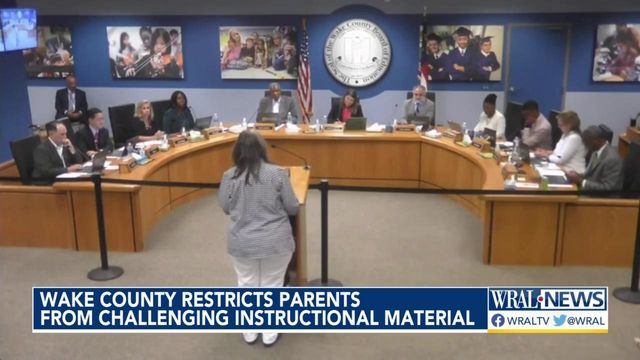Facing surge in book complaints, Wake school board changes challenge policy
The Wake County Board of Education is revising its policy for reviewing challenges to instructional materials, including library books.
The board voted Tuesday night on the policy revision, which it has been debating for months.
Earlier this summer, the school board revised its policy for book selection that stated books could not be “pervasively vulgar,” a requirement of state law.
The revision that passed Tuesday has less to do with what books would be selected for instruction and more to do with how books could be challenged by parents or guardians who don’t like them. It specifies or changes who would be involved in the challenge processes and adding timelines to appeals, reviews and decisions.
Board members Cheryl Caulfield and Wing Ng voted against the changes. They were in part opposed to adding students to the district-level review committee and making decisions binding for two years.
During public comment, former school board candidate Chad Stall said the district’s plan to review books and judge them in their entirety, rather than by select passages, ignores the fact that books don’t have warnings of sexual content on the cover. The board is avoiding addressing “obscenity,” he said.
Renee Sekel said the revised policy balances school and parent interests. The board doesn’t need “to parent for me” by restricting access to too many books, she said. She already has rules for her children for books they can’t read.
The school system, like most across the nation, has fielded more complaints in recent years from conservative or evangelical activist groups targeting books that contain sex scenes or sexual references or address uncomfortable racial issues. They have argued children should not be exposed to sexual content, that books shouldn’t promote LGBTQ+ to children or that certain books paint white people in too negative of a light.
Critics have argued the petitions are more about politics than education and, if successful, would remove valuable books from libraries.
The district has dismissed the majority of those complaints before a review process could begin because the people challenging the books don’t have children in the school system.
Many of the same books are challenged nationwide, as national groups share titles and tactics online for people to use when filing petitions or speaking at school board meetings.
Some of the changes Tuesday are a formalization of existing processes. But many are new, such as making decisions binding for two years at that school or adding high school students to a district-level review committee.
As was the case before, the school will make accommodations for any student whose parent or guardian has objected to a material, such as finding a different book for them to read, even before a committee has reviewed any complaints.
The changes to the policy are:
- All complaints will result in a principal meeting with the parent or guardian, who would then have 20 business days after that meeting to file a formal complaint.
- All appeals of decisions must be filed within 20 business days.
- All reviews must take place with 30 business days, unless an exception is made for things such as the length of the book.
- Committees will remove or modify access to the material if it finds the material is “educationally unsuitable, pervasively vulgar, or inappropriate to the age, maturity, or grade level of the students.”
The stages of the review process will look like this:
- For supplemental (non-required) materials, such as library books, the first step of the review process will be a school-level “reconsideration committee,” which would have 30 days to read the material in full and form an opinion on it based on the material as a whole and not isolated passages. The committee would consist of a media coordinator, two teachers who are experts in the subject area, a school counselor, two parents or guardians and the principal.
- For core instructional materials (required reading for a core subject area like reading or math), the first step of review will be a district-level Central Instructional Materials Committee. That would also be the second level of review, on appeal, for supplemental materials. The committee would consist of several administrators, including some who are experts in the subject area, at least two parents or guardians, and two high school students in the superintendent area. No committee members can come from school where complaint originated.
- The next step for review on appeal would be a school board panel, where arguments would be made in written record and not through a presentation. This decision would be final.











